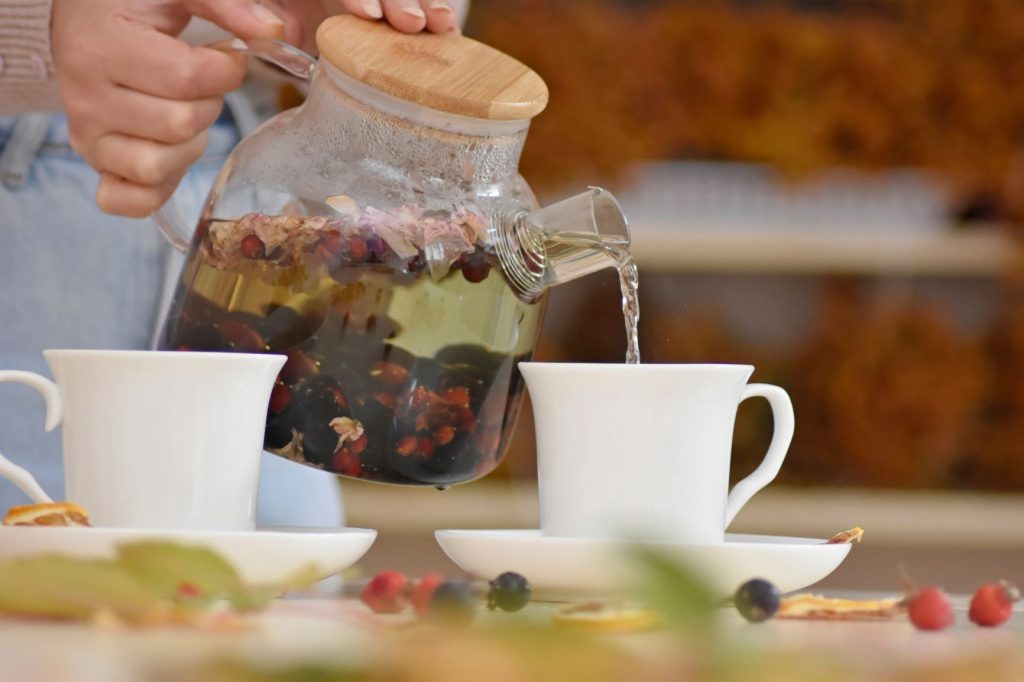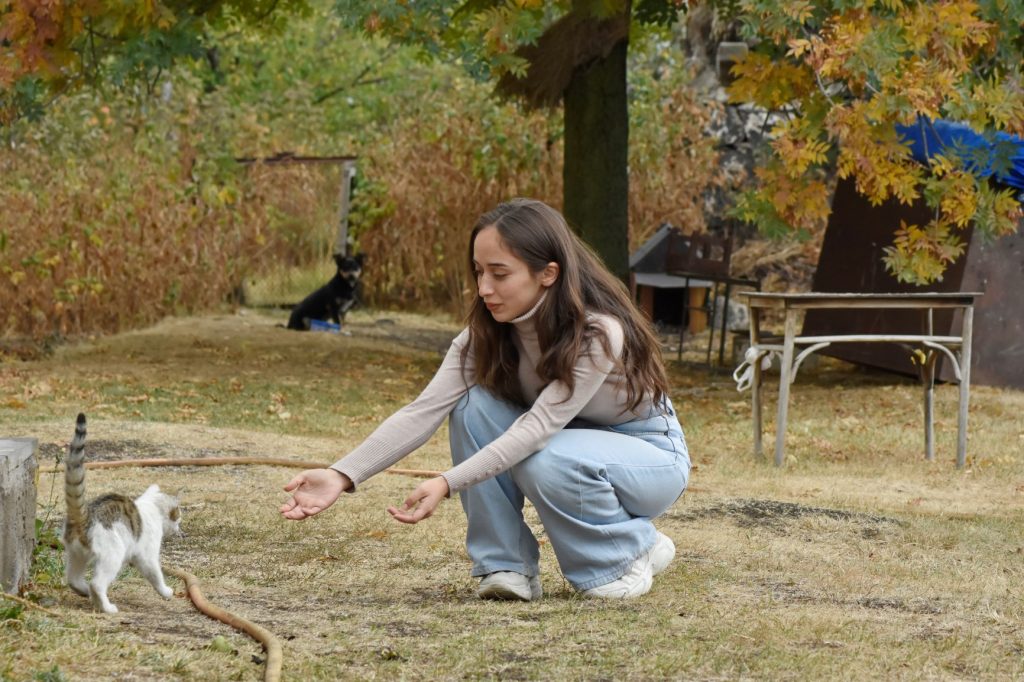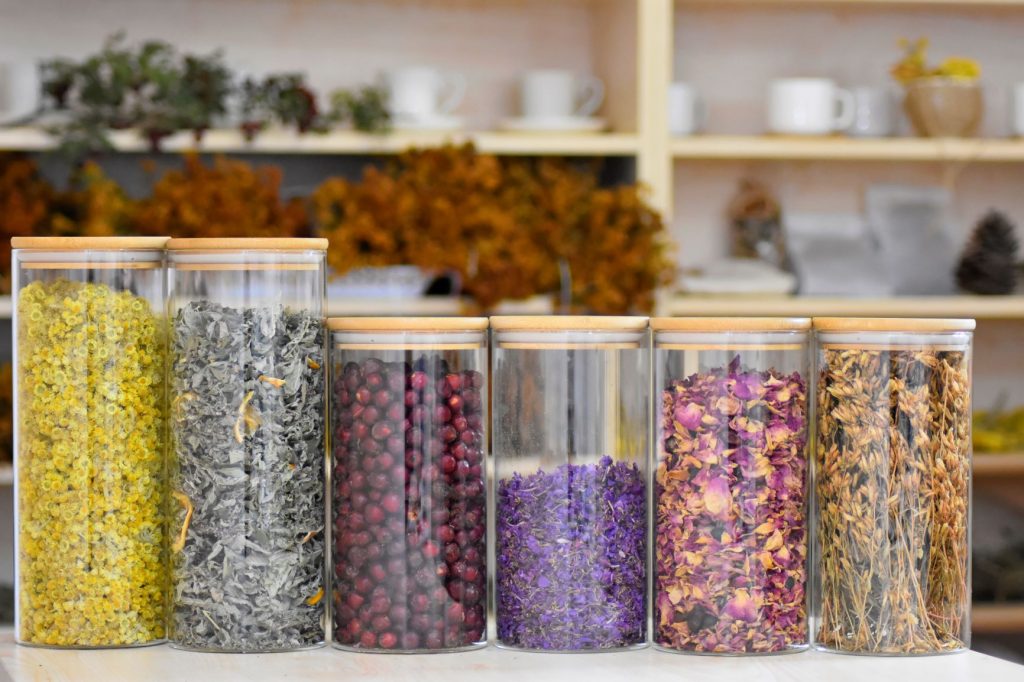Tea business in Ninotsminda and a 22-year-old female entrepreneur: How the EU and CENN help youth

The story below is a look at how a region populated by an ethnic minority can undergo change, and a family tradition of collecting herbs can transform into a successful local enterprise.
We are in the town of Ninotsminda, located in the cold southern region of Samtskhe-Javakheti, Georgia.
In a small room full of dried herbs, a young woman, Mzsia, is putting some dog-rose, berries and thyme in a steel ball. The water is boiled in an electric kettle. She carefully pours the boiled water into kettle.
The liquid in the round glass kettle first turns yellow and then a pinkish colour. The room is full of the scent of tea.

This is Mzisa Khmaladze, 22. She lives in the town of Ninotsminda with her parents and brother and sister. She is a student, studying theatre arts at Shota Rustaveli Theatre and Film Georgia State University in Tbilisi.
Mzisa is the youngest female entrepreneur in Ninotsminda. She laughs when she hears these words as she remembers what the neighbours told her when she mentioned her business idea:
“Why do you need this business? What should you do when you get married? Your husband will not let you do it.’’
A Family Tradition Turned into a Business Idea
Mzisa turned her family tradition into a business. Mzisa remembers how her family collected herbs throughout the Ninotsminda fields in her childhood. At the time, Mzia was bored with this activity as she didn’t like tea.
As she grew older and became a student, she discovered tea houses in Tbilisi, where she fell in love with tea:
“Since that time, I couldn’tstop thinking that I should do something with the many herbs we have at home.’’
It took a short time to come up with an idea. Mzisa leads an active lifestyle. In the first years of being a student, she mostly spent her time in Ninotsminda due to the pandemic, and one day she found herself at the meeting with CENN at the youth center in Ninotsminda.

“During this meeting, CENN representatives presented a project that was to be launched shortly with EU funding. The focus was on young people and social and green entrepreneurship. When I left the meeting, I immediately knew what I had to do.’’
Mzisa was born into a Georgian-Armenian family. Her mother is an ethnic Armenian, while her father is Georgian. Mzisa’s mother and her relatives find it difficult to speak Georgian:
“All my relatives from my mother’s side are ethnic Armenians. I always wanted to know what kind of problems they had. In the Javakheti region, people lived in isolation for a long time a this is why they had integration problems. For them it was also difficult to understand Georgian legislation. While signing some documents, they weren’t able to read the content. I always wanted to resolve this problem, but did not know how to do it.’’
Georgian language courses were already being provided to people of various ages in Ninotsminda, so Mzisa tried to think of something different. After the CENN meeting, Mzisa realized how she could combine her family tradition and her community’s troubles.
Rund Tea – EU assistance for Mzisa
The EU4Youth project, Social Entrepreneurship Ecosystem Development (SEED) Programme for Green Growth in Borderline Communities, was launched in December 2019 by CENN with its partner organizations Green Lane NGO (Armenia) and KRDF (Georgia), with funding from the EU.
The project’s objective is to develop the entrepreneurial potential of young people living in the border regions of Georgia and Armenia, improve their skills in social entrepreneurship and green innovations, and promote their employment. This project is part of a large EU initiative supporting youth in the region.
Mzisa submitted an application in 2021. Rund Tea was the name of her project.
The green direction of Mzisa’s project concerned the use of non-wood forest resources. As for its social mission, it included teaching Georgian to the Armenian minority to help them integrate into Georgian society.
Mzisa’s idea was welcomed. The next phase was a long stage of training, with development of the business idea and business plan. Mzisa’s childhood memories turned into a business.
The total cost of Mzisa’s project was over 20,000 GEL. She received approximately 17,000 GEL in funds from the EU.
An Old Storeroom is Turned into a Tea Enterprise
First and foremost, Mzisa was in need of a space where she could start her business.
“We had an old storeroom in the yard for storing products in winter, though it wasn’t good for preserving. Using the CENN funding we totally renovated the building.’’
Wood shelves were put up in the newly-renovated room, a drier was installed, nice glass pots were supplied for storing dry herbs, while kettles were provided for tea making. The old storeroom was turned into a tea room.

With CENN support Mzisa succeeded in product branding, made a logo and purchased the packing materials. Finally, at the end of 2021, she sold her first package of tea at the Christmas market in Ninotsminda.
Currently there are eight types of tea in Mzisa’s tearoom, namely: mint, St. John’s wort, rose, perennial flowers, thyme, hawthorn, fireweed and dog-rose. Three of them–mint, St. John’s wort and thyme–have already passed laboratory inspection and received a license.
If a customer wants to try a mixed variety, Mzisa is ready to make a special blend. The customer may also choose their own blend, of course.
Now Mzisa plans to receive a bio-certificate, put her teas on a list of bio-products, change the package and send her teas outside the region, namely in Tbilisi supermarkets.
Mzisa’s products are now mostly sold in Ninotsminda supermarkets and online, via social media. Mzisa often visits exhibitions and festival markets to familiarize consumers with her teas.
A Social Mission: The Georgian Language Club in Ninotsminda
Apart from working as a tea maker, Mzisa spends all her spare time at the Georgian Language Club in Ninotsminda.
About thirty young people have already taken the Georgian language course, begun at the beginning of March online due to a lack of funds and students coming from different towns across the region.
“First, we received about seventy applications when we advertised the Georgian language course. Out of the seventy applicants, fifty started studying Georgian, while thirty or so finished the course. There were three groups separated by age: from six to ten years old, from ten to fifteen years old, and fifteen and above.’’
Mzisa and two friends of hers taught the Georgian language lessons. Vlad Terteryan, 22, and Eriknaz Markaryan, 19, also assisted her in acquiring study materials.
“Eriknaz is taking an education course at Samtskhe-Javakheti State University and gives me with the materials she is given there. We also use the Zhvania School materials for grammar. For improving speaking level we watch films, provide our students with books, and plan various activities like presentations, training courses, interesting conversations and discussions about books,’’ Mzisa says.
The first bunch of students has already finished the course, and Mzisa has more plans for the next. She wants for example to invent a tabletop game.
“The game will include Georgian words written on the cards. The players will have to identify these words. This is still only an idea. I want to use these cards in the tea package and so my tea will also have educational purposes,’’ Mzisa says.
The young female entrepreneur from Ninotsminda represents the best example of how a family hobby can be turned into a business, change one’s life and the lives of those in the community.